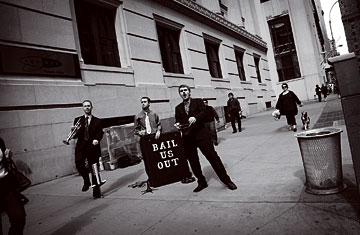
Shades of the past: Echoing scenes from the Great Depression, New York City street performers lampoon Wall Street bailouts
(2 of 2)
Going Up the Mountain
As they gather in Davos, Switzerland, for the annual meeting of the World Economic Forum (WEF) from Jan. 28 to Feb. 1 — a meeting that promises to be the most significant the WEF has ever held — this is the miserable picture that assembled politicians, industrialists, financiers, academics and representatives of NGOs will confront. Some, surely, will be chastened, remembering, in the somber words of Barack Obama's inaugural speech, that the weakened state of the U.S. economy was "a consequence of greed and irresponsibility on the part of some, but also our collective failure to make hard choices." They might even recall his injunction, in the words of Scripture, to "set aside childish things," though one expects that Davos' parties will be as good as ever. But in all the reconstructions of what happened and why that will be discussed at Davos, and all the plans to put things right with which it will be replete, those attending the annual meeting this year will not get far if they do not engage in some solid examination not of balance sheets and national income accounts but of ideas.
For it is in the realm of ideas, and of intellectual inquiry, that true understanding of the present crisis, and any amelioration of it, must be found. We all need to interrogate two profound paradoxes of the era of globalization. First, as Martin Wolf of the Financial Times points out in his wonderful book Fixing Global Finance, a period of sustained global economic growth has also been one of constant financial crisis. From the Latin American debt crises of the 1980s, through the Asian financial implosion of the 1990s to the current worldwide credit crunch, global capital flows — whether because of greed, because of poor institutional structures or for myriad other reasons — have not only fed enterprises around the world, but also created enormous and painful economic dislocation. We need to understand why, and we need to at least try to build the institutions and create the rules that help the first, beneficial role of global finance, while guarding against its second, destructive one.
Another paradox is just as puzzling. Though globalization — or more accurately, the outward-orientation of formerly closed economies — has brought innumerable benefits to millions, poverty remains deeply entrenched in our world, even in those parts of it that, measured by the dry indicia of macroeconomics, have done well. Conventional wisdom has long insisted that if nations got the economic fundamentals right — allowed the market to set prices, were fiscally responsible, established systems of property rights and dispute resolution — the gains would trickle down to the poor. In some nations, that has happened. But as Michael Schuman details in a following story, anyone who has seen the backbreaking poverty that can be found in China and India a mere stone's throw from gleaming factories and call centers knows that is not always the case. Poverty is a misery even in good times. In periods of sustained contraction, such as we now risk experiencing, it can strip the attributes of humanity from millions. Now more than ever, we need to know what policies and institutions can genuinely ameliorate, and eventually eliminate, abject poverty.
These questions are important, because the ideas that have fueled a generation of global capitalism are not God-given. They are not always bound to win the day. In the aftermath of the Wall Street crash in 1929, the U.S. turned its back on the world, erecting tariff walls that guaranteed that the world slump would become deeper than it needed to be. As Peter Gumbel demonstrates in the next story, in an earlier era of globalization — the one that began in the mid-19th century — the inequality with which economic gains were distributed led to political convulsions that eventually cost the lives of untold numbers.
That is why it is ideas — their history and their consequences — that should be the lifeblood of this year's Davos meeting, not the search for comfort in a fairy tale about a little girl, three bears and a bowl of porridge. Time to set aside childish things, indeed.
— with reporting by Michael Schuman/Hong Kong and Adam Smith/London